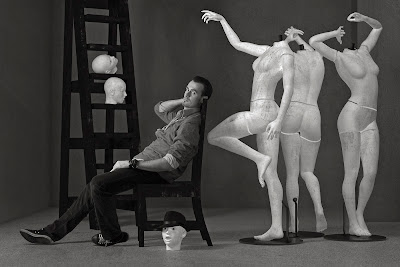My respect for David Carr, the New York Times reporter, bestselling author, and (with A.O. Scott) Times video celeb, has been reported here. What you've not seen on this blog is talk about Carr's reportorial memoir, The Night of the Gun. By his own admission, Carr was a substance abuser of the very first order—a "maniac" who went from handling whiskey and cocaine (barely) to not handling crack to smacking women he loved with an open hand to raising twins while failing at rehab to carrying a gun he doesn't remember, or didn't remember until he started tracking down his own past.
Like the scrupulous Times reporter he miraculously became, Carr sought out and interviewed those whose lives intersected his during his wilderness years. He weighed his idea of things against police records and the recall of old friends. He sorted, sifted, and spun in an attempt to understand not just who he was, but who he is, and how the was and the is somehow survive inside the same knocked-about skin.
It's fascinating reading, memoir painstakingly stitched. It has a lot to say not just about Carr's life, but about what truth is and what to do with all the stuff we can't rightly remember. Here's an early paragraph that wisely captures one of my pet peeves (we shall read more about this in Handling the Truth)—memoirs filled with dialogue from hazy childhood days.
I read some of the classics of the genre, debunked and not. After reading four pages of continuous ten-year-old dialogue magically recalled by someone who was in the throes of alcohol withdrawal at the time, I wondered how he did it. No I didn't. I knew he made it up. It was easy and defendable, really, sublimating and eliding the past in service of a larger Emotional Truth. Truth is singular and lies are plural, but history—the facts of what happened—is both immutable and mostly unknowable. Can I somehow remember enough to type my way to an unvarnished recitation of what happened to me? No chance.A note for the curious: I use Lana Roosiparg's gorgeous face as my photo of the day for no other reason than that it is a singular, and therefore, true one. Lana is one of the four talented and lovely people recently featured in my husband's art. This is an outtake from the photo shoot that yielded those hallucinatory worlds.























I like what he says about history being mostly unknowable. This is what fascinates me about memoir because memory is so unreliable, that our truths may not be 'true' and yet they are true as the writer remembers it. I don't know, if I think about it too much, it starts to feel really trippy. Have you seen the documentary 'Page One: Inside the New York Times'? It turned me into a Carr fan.
As a side note, that woman is stunning.
This sounds like a poignant journey for Carr. I like that he set about writing it with help from actual police reports and interviews with those who intersected his life.